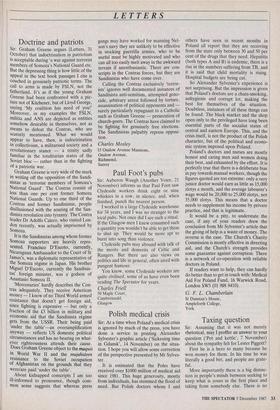Polish medical crisis
Sir: At a time when Poland's medical crisis is ignored by much of the press, you have done a service in printing Alexander Sylvester's graphic article (`Sickening time in Gdansk', 14 November) on the situa- tion. I hope you will allow some correction of the perspective presented by Mr Sylves- ter.
It is estimated that the Poles have received over $1000 million of medical aid since 1981. This huge generosity, mostly from individuals, has stemmed the flood of need. But Polish doctors whom I and others have seen in recent months in Poland all report that they are receiving from the state only between 30 and 50 per cent of the drugs that they need. Hepatitis (both types A and B) is endemic, there is a rise in the numbers suffering from TB, and it is said that child mortality is rising. Hospital budgets are being cut. So Alexander Sylvester's experience is not surprising. But the impression is given that Poland's doctors are a chain-smoking, unhygienic and corrupt lot, making the best for themselves of the situation. Doubtless, instances of all these things can be found. The black market and the shop open only to the privileged have long been essential parts of the socialist states of central and eastern Europe. This, and the crisis itself, is not the product of the Polish character, but of the political and econo- mic system imposed upon Poland.
Poland's doctors and nurses are mostly honest and caring men and women doing their best, and exhausted by the effort. It is perfectly true that there is a deliberate bias in pay towards manual workers, though the figures quoted are too extreme: only a very junior doctor would earn as little as 15,000 zlotys a month, and the average labourer's wage would be 20,000 to 25,000 zlotys, not 35,000 zlotys. This means that a doctor needs to supplement his income by private practice, and that is legitimate.
It would be a pity, to understate the case, if any of your readers drew the conclusion from Mr Sylvester's article that the giving of help is a waste of money. The reverse is the case. The Church's Charity Commission is mostly effective in directing aid, and the Church's strength provides some guarantee against corruption. There is a network of co-operation with reliable doctors in Poland.
If readers want to help, they can hardly do better than to get in touch with: Medical Aid For Poland Fund, 16 Warwick Road, London SW5 (01 998 9410).
G. F. L. Chamberlain
St Dunstan's House, Ampleforth College, York










































































 Previous page
Previous page